
Julie London was an American singer and actress whose career spanned more than 40 years. A torch singer noted for her contralto voice, London recorded over thirty albums of pop and jazz standards between 1955 and 1969. Her recording of "Cry Me a River", a song she introduced on her debut album Julie Is Her Name, was inducted into the Grammy Hall of Fame in 2001. In addition to her musical notice, London was nominated for a Golden Globe Award in 1974 for her portrayal of Nurse Dixie McCall in the television series Emergency!

Bethlehem Records was an American jazz independent record label, founded by Gus Wildi in 1953.
"And That Reminds Me", also known as "My Heart Reminds Me", is a popular song.
"Do Nothing till You Hear from Me" is a song with music by Duke Ellington and lyrics by Bob Russell. It originated as a 1940 instrumental that was designed to highlight the playing of Ellington's lead trumpeter, Cootie Williams. Russell's words were added later. In 1944, Ellington's own recording of the song was a number one hit R&B chart for eight non-consecutive weeks and number six on the pop chart.
"Heartaches by the Number" is a popular country song written by Harlan Howard, and published in 1959. The sheet music was a best seller in both the US and Britain in January 1960.
"Love Letters" is a 1945 popular song with lyrics by Edward Heyman and music by Victor Young. The song appeared, without lyrics, in the film of the same name released in October 1945. A vocal version by Dick Haymes, arranged and conducted by Young, was recorded in March 1945 and peaked in popularity in September. "Love Letters" was subsequently nominated for the Academy Award for Best Original Song in 1945, but lost to "It Might as Well Be Spring" from State Fair.
"My Baby Just Cares for Me" is a jazz standard written by Walter Donaldson with lyrics by Gus Kahn. Written for the film version of the musical comedy Whoopee! (1930), the song became a signature tune for Eddie Cantor who sang it in the movie. A stylized version of the song by American singer and songwriter Nina Simone, recorded in 1957, was a top 10 hit in the United Kingdom after it was used in a 1987 perfume commercial and resulted in a renaissance for Simone.
"P.S. I Love You" is a popular song with music by Gordon Jenkins and lyrics by Johnny Mercer. published in 1934.
"It Might as Well Be Spring" is a song from the 1945 film State Fair. which features the only original film score by the songwriting team of Richard Rodgers and Oscar Hammerstein II. "It Might as Well Be Spring" won the Academy Award for Best Original Song for that year.
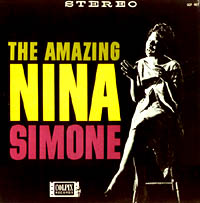
The Amazing Nina Simone is the second studio album by Nina Simone, released in July 1959. It was her second album, and her first recording for Colpix Records. The album contains a variety of material, including jazz, gospel, and folk songs. Compared to her debut, which showcased Simone's piano playing ability in addition to her singing, the piano was downplayed on Amazing in favor of string arrangements.

Little Girl Blue: Jazz as Played in an Exclusive Side Street Club is the debut studio album by Nina Simone. Recorded in late 1957, it was eventually released by Bethlehem Records in February 1959. Due to the length of time the album had taken to be released and the lack of any promotional single either immediately before or alongside the album, Simone would become disillusioned with Bethlehem and sign with Colpix Records in April 1959. She recorded the tracks for her second album - what would become The Amazing Nina Simone - the same month. However, in May Bethlehem finally released a single, "I Loves You, Porgy" and gave Simone her first hit later that year, peaking at number 18 on the pop charts, and number 2 on the R&B charts. Helped by the profile of the single, the album too went on to become a chart success.
"I'm in the Mood for Love" is a popular song published in 1935. The music was written by Jimmy McHugh, with the lyrics by Dorothy Fields. The song was introduced by Frances Langford in the movie Every Night at Eight released that year.
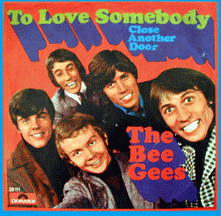
"To Love Somebody" is a song written by Barry and Robin Gibb. Produced by Robert Stigwood, it was the second single released by the Bee Gees from their international debut album, Bee Gees 1st, in 1967. The single reached No. 17 in the United States and No. 41 in the United Kingdom. The song's B-side was "Close Another Door". The single was reissued in 1980 on RSO Records with "How Can You Mend a Broken Heart" as its flipside. The song ranked at number 94 on NME magazine's "100 Best Tracks of the Sixties". It was a minor hit in the UK and France. It reached the top 20 in the US. It reached the top 10 in Canada.
"I Get Along Without You Very Well" is a popular song composed by Hoagy Carmichael in 1939, with lyrics based on a poem written by Jane Brown Thompson.
"(You'd Be So) Easy to Love" is a popular song written by Cole Porter for William Gaxton to sing in the 1934 Broadway show Anything Goes. However Gaxton was unhappy about its wide vocal range and it was cut from the musical. Porter re-wrote it for the 1936 film Born to Dance, where it was introduced by Eleanor Powell, James Stewart, and Frances Langford under its alternate title, "Easy to Love". The song was later added to the 1987 and 2011 revivals of Anything Goes under the complete title "You’d Be So Easy to Love".

"Willow Weep for Me" is a popular song composed in 1932 by Ann Ronell, who also wrote the lyrics. The song form is AABA, written in 4
4 time, although occasionally adapted for 3
4 waltz time.
"Say It Isn't So" is a popular torch song by Irving Berlin, published in 1932. The song was written when Berlin was suffering a loss of confidence following several setbacks, and he initially placed the song in a drawer, feeling that it would not be successful. However, one of Berlin's employees, Max Winslow, heard it, and on his own initiative, took it to Rudy Vallée, who was then a major star on radio. Vallee sang it on his radio show and it became an immediate hit.
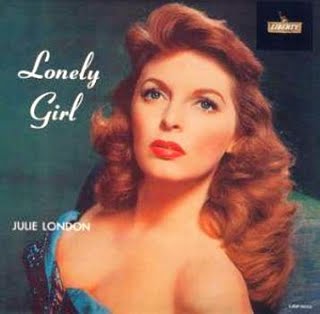
Lonely Girl is an LP album by Julie London, released by Liberty Records under catalog number LRP-3012 as a monophonic recording in 1956, and later in rechanneled stereo under catalog number LST-7029 in 1959.
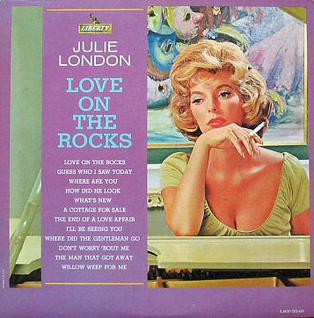
Love on the Rocks is an LP album by Julie London, released by Liberty Records under catalog number LRP-3249 as a monophonic recording in 1963, and later in stereo under catalog number LST-7249 the same year.
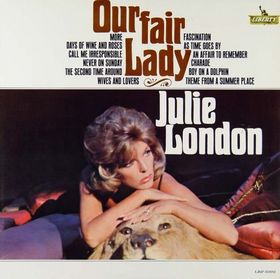
Our Fair Lady is an LP album by Julie London, released by Liberty Records under catalog number LRP-3392 as a monophonic recording and catalog number LST-7392 in stereo in 1965.









